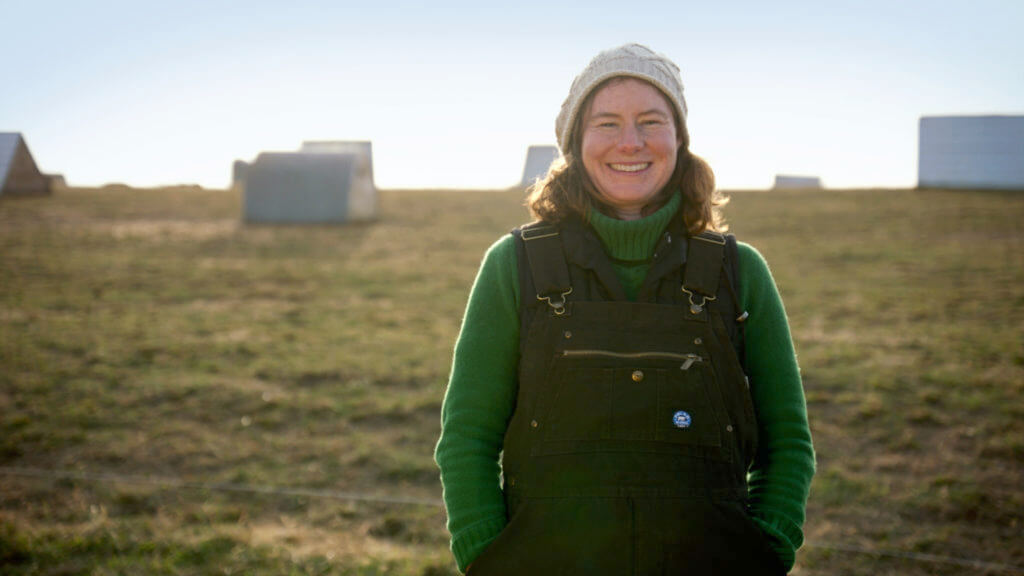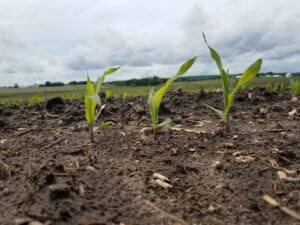Composting & Small Family Farms
May 4, 2022The Power of Niman Ranch, Composting & Small Family Farms
By Cassandra Loftlin, East Coast-based Food Writer and Recipe Developer focusing on ways to connect home cooks with local farmers.

April Wilson began raising show pigs at the age of nine. By the time she completed high school she was a two-time winner in the 4-H Swine Show. After graduating from college, she left the farm and lived in the city for over a decade.
“My father called to tell me that he was getting rid of the pigs because no one was interested in raising them,” Wilson said. “ I had never forgotten about my love of raising pigs. I came back because I missed the farm.”
Wilson is now a third-generation hog farmer and works alongside her mother and father, her two brothers and their wives at Seven W Farm—where they are also using hog manure-based compost to support their farm and protect the planet.
While each farm in the Niman Ranch network looks a bit different, they all strictly follow the animal care protocols, one of which requires bedding for the pigs. “We use wheat, oat and barley straw,” Wilson shared of her family’s farm. “They love to root around and lay on it.” The sows also use the bedding to build nests when they are ready to have piglets.

As the bedding is soiled, a fresh layer of straw is applied and eventually the straw and pig waste begin to break down or compost, with the help of the little hooves above naturally turning and aerating the compost. The compost has an added benefit: The heat generated from decomposition helps to keep the pigs warm through the winter. In the spring, the compost is transferred to a windrow, a large open container, for months until completely decomposed. This results in a nutrient-rich fertilizer that can be used on the farm to recondition the soil and increase its ability to retain moisture, preventing water runoff and soil erosion.
This method of manure management is quite different than conventional scale hog production. On industrial pig operations, pigs are raised on slatted floors, allowing waste to fall into a pit below. The pig waste is then stored in massive lagoons; as it breaks down, ammonia is released into the air. The untreated waste, which has a high nitrogen content, is sprayed directly on surrounding crops. The excess nitrogen can contaminate drinking water by either leaching underground or through water runoff during heavy rains.
“It is difficult for an industrial farm to practice regenerative agriculture with the animals confined and overcrowded,” Wilson said. During a recent storm, the Wilsons were able to clearly see water runoff from area farms that implement less sustainable practices.
“The answer for a better environment is more farmers and smaller farms,” Wilson continued.
Niman Ranch and its network of U.S. family farmers and ranchers are focused on regenerative farming practices, and holistic and dynamic approaches to revitalize the environment. In addition to composting, Wilson uses rotational grazing, cover crops and organic practices for healthier soils.
New research from the Rodale Institute indicates that large-scale ecological rehabilitation can be achieved through regenerative agriculture. Carbon dioxide makes up the majority of the greenhouse gases contributing to the warming trend, and agricultural soil naturally has the ability to sequester or stabilize and store carbon emissions at lower depths. Increasing healthy soil mass through regenerative practices including compost usage reduces climate-damaging levels of atmospheric carbon dioxide while improving soil structure and eliminating soil erosion.
The Wilsons’ radically traditional approach to farming through composting and other regenerative practices delivers a sustainably sound solution to both family farms and consumers.
 This article is an excerpt from the Niman Ranch 2021 Impact Report.
This article is an excerpt from the Niman Ranch 2021 Impact Report.
Follow the author Cassandra Loftlin on Twitter.
LEARN MORE: Read Niman Ranch’s 2021 Impact Report
